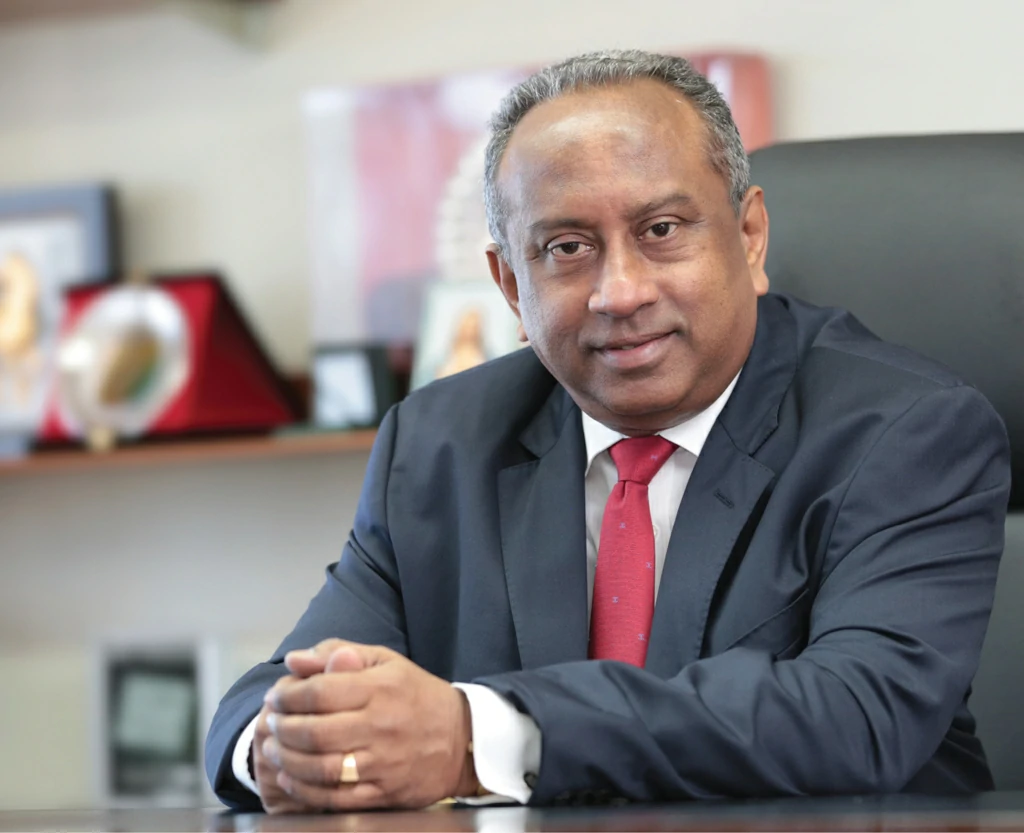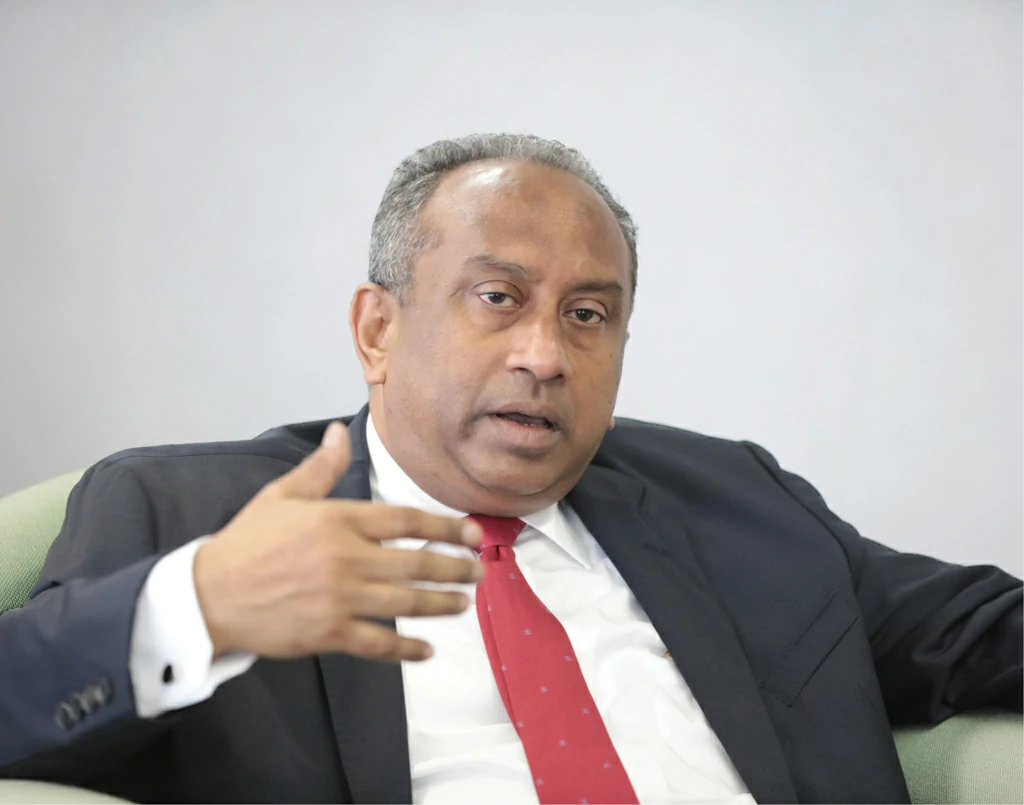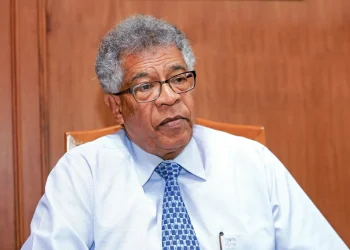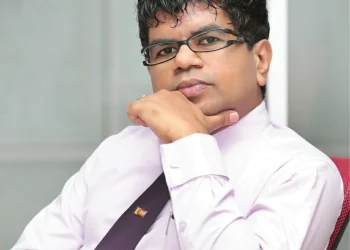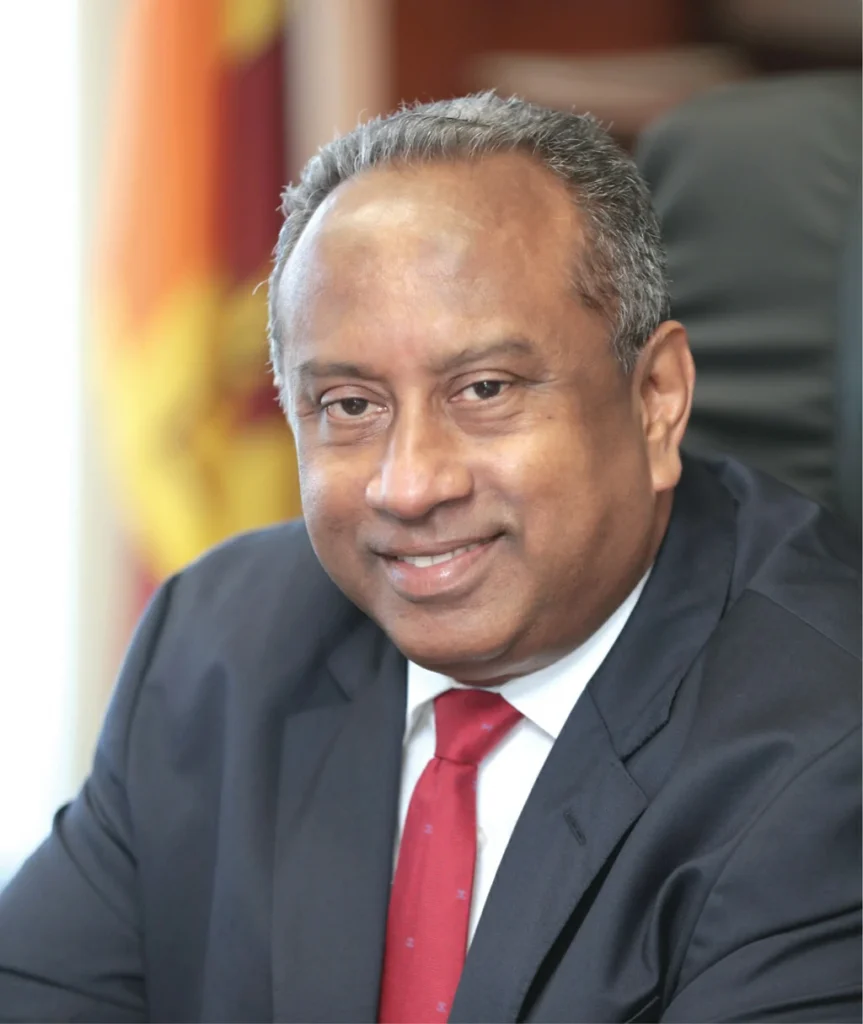
Bank of Ceylon has always been the icon of stability for the banking industry in Sri Lanka. Having been the first state commercial bank in the country, BOC has fulfilled its role continuously evolving to cater to the changing needs of customers. Ronald Perera, Chairman of the largest bank in Sri Lanka is a President’s Counsel. Yet, he has been able to garner his career experiences for the future growth of the Bank. He speaks about the many achievements as well as strategies in place so that Bank of Ceylon continues to be number 1 and the Bankers to the Nation.
By Udeshi Amarasinghe. Assisted by Yomal Senerath-Yapa
Photography Mahesh Bandara and Menaka Aravinda
How have you drawn upon your experiences as a litigator to your current position as the Chairman of BOC?
First and foremost, as a practicing lawyer I always study my briefs. That is, whatever case or issue that comes to me, I study the facts. I attempt to master all the facts that are available so that I can present the case for my client favourably. Similarly, when I became Chairman of BOC, I studied the workings of the Bank and the problems faced by the institution to formulate a plan and strategy to take the institution forward.
I was a Director of Bank of Ceylon (BOC) for almost two and a half years in 2002. Therefore, the Bank is not a new place to me. I have had connections to the BoC for a long time. My experiences as a lawyer, where I have been involved in banking law and commercial law has also helped me in my role as Chairman.
As the Chairman of BOC what are your plans and vision for the biggest state bank in Sri Lanka?
We are not only the biggest state bank; we are the biggest bank in Sri Lanka. My vision as well as plan is to continue to hold on to our reputation as Bankers to the Nation by being the premium financial services provider to the country and its people. I wish to continue Bank of Ceylon’s position as the largest bank in Sri Lanka. Our aim is to continuously innovate, to offer technologically advanced products and expand our reach through digital channels so as to remain ahead of competition and also be next-generation-friendly. We must remember that approximately 30 per cent of the country’s population falls into the 25 – 40 years’ age bracket, thus requiring the bank to increase our technology-based products and channels, which we are prepared to meet with our young and dynamic staff.
We Are Not Only The Biggest State Bank; We Are The Biggest Bank In Sri Lanka. My Vision As Well As Plan Is To Continue To Hold On To Our Reputation As Bankers To The Nation…
Our commitment is to enhance sustainability. We will continue to drive towards ‘Green Banking Initiatives’ while supporting specific projects that have the welfare of the environment at heart.
How has BOC evolved over the years as the first state commercial bank in the country?
The Bank of Ceylon was established on August 1, 1939, as a result of the findings of the Banking Commission appointed several years before, which affirmed the requirement for a commercial bank in Sri Lanka. They found that Ceylonese businessmen did not have easy access to commercial banking facilities. The foreign banks that were operating in Ceylon (Sri Lanka) did not give facilities to Ceylonese businessmen, that those of Sri Lankan origin. Businessmen had to seek money lenders; we have heard of the Afghan money-lenders of old days who charged very high rates of interest. Ceylonese businesses were stifled because they had no access to finances on reasonable terms. Bank of Ceylon was established in the year 1939 to fulfill that requirement.
Our first branch was the City Office in Fort and the second branch was opened in Kandy. Now, after almost 78 years we have a network of 627 local branches, three overseas branches and a banking subsidiary in London, over 850 ATMs and CDMs, which together count to nearly 1,500 customer touch points. We also have approximately 8,000 employees, which will increase by over a 1,000 in the next few months because we are in the middle of a recruitment process. As a state bank we have to conduct exams, interviews and have a very transparent process in recruiting new staff.
The Bank of Ceylon was the first Sri Lankan bank to establish a branch overseas. Our first foreign branch was the London branch opened in 1949. Then we opened a branch in Male in 1981, Chennai in 1995 and the Seychelles branch in 2014.
The Bank provides banking services to a very diverse customer base from individuals to SMEs, large corporates as well as Government organisations. We also lend to the farmers and fishermen; we have customers in all social groups in Sri Lanka. We also serve Sri Lankan expatriates working overseas. We receive over 43 per cent of foreign remittances to Sri Lanka from Sri Lankans working abroad; that is from South Korea to the Middle East and Italy and other countries. This is done through our foreign correspondent banks and our foreign agents in the countries. It must be understood that it is not economically feasible or possible to have branches in all these countries.
BOC, In Its Almost 78 Years Of Existence, Has Now Got The Highest Profit Earnings Of A Single Business Entity In Sri Lanka.
BOC, in its almost 78 years of existence, has now got the highest profit earnings of a single business entity in Sri Lanka. In 2015 our profit was 25.3 billion rupees and last year, 2016, profit before tax was 31.2 billion rupees, which was the largest profit earned by any single business entity in Sri Lanka, whether state or private owned. Then we have the strongest balance sheet among Sri Lankan business entities with what we call “three trillions”; we have over a trillion in assets, over a trillion in loans and advances, and over a trillion rupees in deposits. The last milestone of a trillion was in loans and also advances, which we achieved in 2016. Therefore, we are the only bank with this three trillion pillars.
We have over 12 million account holders; that is, over half of the Sri Lankan population banks with us. Going forward, we realise that BOC has to digitally transform itself. Digital transformation has revolutionarily modified the banking industry globally including in Sri Lanka. We have the ability to extend these modern banking technology to customers in both urban and rural areas.
The Bank of Ceylon has addressed the current customer requirements of convenience and speed with special products, which are also appealing to the youth. We have Smart Zones in branches therefore people can go and also transact business through ATMs and CDMs even during non banking hours. They do not have to wait for the bank to open. Then we have started an account called the SmartGen. It can be opened in a matter of minutes. No savings book or statements are given; your bank statement is available via email.
Considering that Sri Lanka has a lot of private banks, and customers have greater access to them. How does BOC as a state bank deal with this situation?
The banking industry in Sri Lanka is very competitive, because we not only have other state banks doing the same thing but we also have a number of private banks and a number of international banks, which are operating in the country. And you will appreciate that because we are a fully state owned bank, we have a streamlined process for operational activities.
We have grown over the years and our balance sheets show that customers have no hesitation in coming to Bank of Ceylon. One, because we are state owned; secondly, we are stable; three, because of our performance and fourthly, we give very good service. At times people are surprised that we give such good service. We keenly focus on our customer care, because I have always held the view that it is the branch in a village or town that people know as “the Bank of Ceylon”. They may not know what is happening in Colombo. If you are somewhere out of Colombo, your view of Bank of Ceylon will be how those people in the branch perform. Therefore, we emphasise that the staff, especially the counter staff and those dealing with customers directly, to be friendly, courteous and helpful. Because there is no alternative to that. If the customers are not treated properly we will lose them. Our figures over the years have shown that we are giving good customer service and we have a wide range of products, starting from personal loans, agricultural loans to large corporate loans. This proves that BOC has a satisfied customer base, covering all income groups.
The Government Under The Leadership Of The President And Prime Minister Has Started A Loan Scheme Called The Swashakthi Loan For Young Persons…
Recently the Government under the leadership of His Excellency the President and the Honourable Prime Minister has started a loan scheme called the Swashakthi Loan for young persons and people who want to start businesses. It is a 250,000 rupee loan and is easily granted because the Prime Minister is of the view that we must empower youngsters. They will not only be self employed but they will also be able to provide employment for others. That, he feels, is the way forward. The Bank of Ceylon is leading the Swashakti Loan scheme. We have already given many loans. The loan application process has been quite simplified and we hope to give many more loans in the near future.
What can you tell us about investments and also the international segment?
BOC has raised two successful international bond issues in 2012 and 2013, which totals up to about one billion US dollars. Bank of Ceylon is the largest issuer of the debentures in the Sri Lankan debt market. The bank has also successfully raised over 44 billion rupees for issuing debentures in the market. During all that time the issue has been oversubscribed on the same day, which shows the high level of investor confidence enjoyed by the Bank of Ceylon. The eighth debenture, issued last year was oversubscribed on the same day.
The BOC is the market leader in foreign remittances with over 43 per cent of market share. We are market leader in NRFC deposits with over 32 per cent of the total deposit. We have 860 foreign correspondent banks and agents to facilitate the remittances into the country.
Can you elaborate on how the Bank of Ceylon is contributing to the various economic sectors of the country?
We provide facilities to all sectors; that is agriculture, fisheries, manufacturing, trading, services and infrastructure development. We provide agriculture loans to the farmers and paddy cultivators, to fishermen we provide loans to purchase boats, nets as well as other equipment.
We Provide Facilities To All Sectors; That Is Agriculture, Fisheries, Manufacturing, Trading, Services And Infrastructure Development.
In addition, to the manufacturing and also trading sectors, we provide loans for construction of factories, openings of LCs and other facilities. To service industries such as tourism; we also provide loans for construction of hotels as well as to purchase equipment and infrastructure development such as road and highway construction, the water projects, which are important large infrastructure construction projects. Bank of Ceylon is leading the funding for all these projects.
If you consider the entire economy of Sri Lanka, we are lending to all different sectors, from the very small amounts to extremely large amounts. In that way we cover all the financial needs of the country.
If we look at the banking industry in general in Sri Lanka, what are your thoughts?
The banking industry in Sri Lanka is a very competitive market, because we have over 24 commercial banks, as well as many financial service providers who cater to the same customer base, which makes it a very challenging field. For example, commercial banks, which are regulated by the Central Bank have to follow various criteria before granting loans. Then we have the finance companies. Banks have to now streamline their processes, control the cost structure and explore new operating models using new tools. Therefore, the pressure on profit for all these institutions is very high, which challenges the sustainable growth and also survival of banks and financial institutions.
We also have another competitor, which is emerging. That is, apart from banks and registered financial institutions, there is a technology-based emerging market that is involved in financial transaction within the country. That is mobile cash and other products given by the mobile telephone companies, which is also a competitor to the conventional banking industry.
These mobile operators giving cash, have the potential to grow, as the companies involved, that is the telecommunication companies, have digital technology at their disposal to take products to the customers. As you know we have more mobile phones than the population; therefore it is easier to propagate these financial products through mobile phones.
This is an area that the banking industry has to address. We are further looking into having more digital products, where we have banking applications on the mobile phones. We are actively working on it. Bank of Ceylon is also in the forefront in this area. Since we have a large and varied customer base, we have to cater to all their needs.
We Also Have Another Competitor, Which Is Emerging. That Is, Apart From Banks And Registered Financial Institutions, There Is A Technology-Based Emerging Market That Is Involved In Financial Transaction Within The Country.
The banks have to look at consolidation; to strengthen their capital base and also to cut down costs. If there is consolidation there will be more banks, which will have one trillion balance sheets, which at the moment very few have. This will also allow them to lower the transaction cost, which will make it more cost effective to the customer.
There is also the informal sector that is lending money to certain sectors that may not be able to access financial institutions. What are your thoughts on this?
One of the easiest transactions in the Sri Lankan banking or financial institutions is to pawn your jewellery. Pawning is very easy, because you do not need any other test. You hand over your jewellery, and they will check it, based on that evaluation, give you money. It can be done in a few minutes. Of course this cannot be extended to large loans, but this is a huge sector. About five years ago gold prices dropped and even the Bank of Ceylon held a huge stock of gold, which could not be disposed of because customers did not come to reclaim their goods. They found that reclaiming it was not worthwhile because the price of gold, for the very first time dropped drastically.
We are trying to streamline our banking process and also our loan applications. We have established the Regional Loan Centres (RLCs) covering all provinces in the country. At the moment we have 13 Regional Loan Centres. We have at least one in each province and we will be setting up more in the near future. We have noticed that a person who applies for a loan gives their loan application to a branch, which may not have the expertise to process this loan application quickly. The Regional Loan Centre has valuation experts, legal experts, credit evaluation experts whose only job is to evaluate the loans that are given. Once you hand over the loan application to the branch they will send it to the nearest Regional Loan Centre, which will process it quickly. Ideally, we have given a time frame of two weeks, you have to make only two visits to the bank: one – to hand over the application; two – to sign the loan and collect the money. That is what we are aiming at. This is one way to wean people away from these lenders and other informal sectors; to get them into the normal banking stream.
Another key aspect the Government is also emphasising is that people should have bank accounts and the salaries of every person should be credited to the bank account. This will bring everyone into the banking stream.
What can you tell us about future plans for BOC?
We want to extend our international presence and now we are seeking to open additional branches in India and the Maldives. Then we also want to significantly enhance the customer engagement with the Bank through special attention to the younger generation who are technology-savvy and who do not want to waste their time by coming and lining up in branches. That is why we are developing mobile apps and remote delivery channels. At the moment we do have some services but we want to increase digital banking, thus more young people will be induced to bank with us.
We wish to move into a comprehensive and sophisticated document management system and further minimise documentation as well as paper use, thereby encouraging ‘Green Banking’. Also, when you have this document management system, from the head office you can supervise any loan application that has been handed in at any branch in the country. That way, if there is a complaint that the loan is getting unnecessarily delayed, we can look at it from the Head Office and speed its process so that the customer will get a better service. As we are a state-owned bank, we want to continue to contribute comprehensively to Government development aims, such as job creation for the young, women entrepreneurs, selected industries such as fisheries as well as agriculture, and bringing the unbanked sector of the population into the banking stream.
With regards to the staff, we wish to recruit more staff and also to provide them relevant training, to ensure they will be able to serve the customers even better.
Over The Many Decades Since The Bank’s Establishment, Our Scope And Also Ambit Has Widened To Encompass The Most Extensive Of Stakeholders…
Although BOC is the largest profit making organisation in the country, I however wish to emphasise that we strive to provide good customer service. That is one very important reason why we are performing well: because of our customer service. It is an important area that we are looking at closely as we want to give an even better customer service in the future.
Can you tell us about yourself?
I am a President’s Counsel. I possess a Bachelor of Laws degree from the University of Colombo and a Master of Laws degree from the University of Northumbria, United Kingdom. I have specialised in civil, commercial, and banking litigation as well as election petitions, and arbitrations. I have been in active practice since I took oaths.
My father, late Paul Perera, was also a President’s Counsel. He was a Minister in the UNP Government in the 1990s. My mother, Kulaseeli Perera, was a member of the Western Provincial Council and was Chairperson of the Council at one stage. My wife, Chrishanti, is an Auditor by profession and we have a daughter, Chiara, who is currently a trainee solicitor in London.
Your message to the readers?
Whatever we have achieved, I must say, was due to a great team effort by all parties concerned at the BOC, and our process of strategising left nothing to chance; we studied the macro environment and internal strengths and weaknesses in detail as well as conducted sensitivity analysis coupled with strengthened risk management.
Throughout this journey, we have remained focused on touching and improving the lives of people from all walks of life across the country. I believe that taking our enterprise as well as achievements together, we have reaffirmed Bank of Ceylon’s Number one position amongst banks in Sri Lanka.
Over the many decades since the bank’s establishment, our scope and also ambit has widened to encompass the most extensive of stakeholders from the State and the blue chip, the large-scale entrepreneurs, medium and small-scale entrepreneurs to the senior citizens, the youth, the women, the students, the man on the street, from the town to the grassroots and Sri Lankans who are working abroad.
We hope to continue this field of service in the future. For many years we have been one of the significant contributors to the Government’s development plan and also the Government’s income. We have always aligned our mission and vision in accordance with the Government’s strategies in terms of the country’s economic development goals. We wish to continue all that in the near future and the Bank of Ceylon is a pioneering force in driving the technological advancement in the banking industry. We have been committed to being the “Bankers to the Nation”, which is the message I wish to send down; that we will continue to be the Bankers to the Nation; and retain our number 1 position, and also to provide an excellent service to the customers and our stakeholders.
